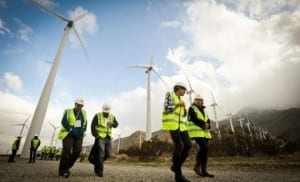 The U.S. Environmental Protection Agency (EPA) recently announced its long-awaited rule to regulate existing power plants and set the framework for state plans to reduce carbon dioxide emissions. Most significantly, the “Clean Power Plan” includes goals to cut carbon emissions from electric power generation by 32 percent by 2030, increase generation from renewables to 28 percent by the same year and gives states and the electric utilities until 2022 to develop final plans to accomplish these goals.
The U.S. Environmental Protection Agency (EPA) recently announced its long-awaited rule to regulate existing power plants and set the framework for state plans to reduce carbon dioxide emissions. Most significantly, the “Clean Power Plan” includes goals to cut carbon emissions from electric power generation by 32 percent by 2030, increase generation from renewables to 28 percent by the same year and gives states and the electric utilities until 2022 to develop final plans to accomplish these goals.
The position of both sides on the U.S. “green economy” revolution and the larger climate change conversation is certainly familiar to anyone who follows the industry and its related policy debates. In fact, Ketchum published a blog post last fall, called “The Shifting Focus of Energy Issues,” outlining the communications and market challenges inherent in any big energy undertaking.
The new, sweeping regulatory shift has the potential to significantly influence the behavior and opinion of a wide range of stakeholders (click to tweet). Examining the point of view of those most directly affected may be one of the keys to understanding the ultimate fate of the EPA’s plan.
The plan will raise business and communications issues at the local, State and Federal level for some time as practices will need to shift – and energy players have voiced concerns about public perception and, ultimately, how this will play out.
So, what does it all mean? Communicators in the space should plan but not panic. In the short term, the plan doesn’t immediately change the sourcing of the materials that fuel U.S. power generation.
On the other hand, the plan does demonstrate that the United States is serious about trying to curtail its overall contribution to climate change, which is a critical move ahead of the December Paris climate talks. This, coupled with the previous executive movement on fuel economy, indicates that the United States is willing to aggressively change how its produces and consumes energy – and communicators should take heed.
A public debate centered on the fate of the planet will play out well for supporters of the Clean Power Plan. The President has been bold in his convictions, saying, “We are the first generation to feel the impact of climate change and the last generation that can do something about it.” When the push-back and States Rights debates inevitably begin, those in favor of the plan will hope that the President’s words resonate above all else.
Those who are not in favor of the plan, namely affected industries and political rivals, will likely seek to take the debate to the local level. And, in some cases, they will succeed. Almost certainly, the investors and employees of utilities and mining companies with significant coal interests will be painted as victims. If the public debate moves and stays on that personal, localized ground, it could significantly influence future implementation of the Clean Power Plan at the state and federal levels.
In the long term, if upheld, the plan will have lasting influence over the investment decisions of utilities, how the United States discusses energy and engages with other countries on energy and climate issues, and the public conversation about the use of executive versus legislative power.



